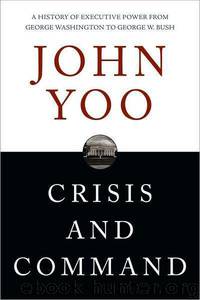Crisis and Command: A History of Executive Power from George Washington to George W. Bush by John Yoo

Author:John Yoo
Language: eng
Format: mobi, epub
Tags: History: American, USA, U.S. President, Constitution: government & the state, Political Science, General, Constitutions, Government, Executive Branch, Executive power - United States - History, Constitutional & administrative law, Law, Constitutional history, United States History (Specific Aspects), Constitutional, United States, Legal status, Executive power, History, Constitutional history - United States, History of the Americas, Presidents & Heads of State, Presidents, United States - General, Political History, National Law: Professional, History - U.S., Presidents - Legal status, etc - United States - History, Biography & Autobiography, Government - Executive Branch, etc., laws
ISBN: 9781607145554
Publisher: Kaplan Publishing
Published: 2010-01-05T05:00:00+00:00
THE GATHERING STORM
FDR'S CLAIM TO GREATNESS lies not in the New Deal, but his defeat of one of the greatest external threats our nation has faced, fascist Germany and Japan. FDR exercised farsighted vision in preparing the nation for a necessary war unwanted by a large minority, and arguably a majority, of Congress and the American people. In the process, the President skirted, stretched, and broke a series of neutrality laws designed to prevent American entry into World War II. Sometimes he went to Congress and the American people to seek support for his actions, sometimes he did not, but throughout the lead-up to war, FDR set national security policy within the executive branch.74
Debate has raged for decades over whether the Japanese attack on Pearl Harbor was a surprise, or whether FDR or the American government had advance knowledge of the attack. Some have suspected that FDR believed that the only way to rouse the American people to war was for the United States to be attacked first. In this respect, FDR had the same instincts as Lincoln. The conventional wisdom today attributes more of the blame for Pearl Harbor to incompetence by the field commanders and complacency in Washington, and has put to rest the idea that FDR actually knew that the Japanese would attack Pearl Harbor.75
Recent scholarly work suggests that FDR managed events to maneuver the Japanese into a corner, with a strong possibility that the Japanese would attack American interests somewhere in the Pacific, most likely the Philippines. Roosevelt's imposition of an arms, steel, and oil embargo against the Japanese Empire was designed to force Tokyo to either withdraw from China or attack American, British, and Dutch possessions in Asia for natural resources.76 FDR pressed Japan in order to bring the United States to bear against the greater threat of Germany.77 FDR could not have walked the United States to the brink of war without a broad understanding of the President's constitutional powers and the willingness to exercise them.
Roosevelt had laid claim to sweeping executive authority in foreign affairs even before war with Germany and Japan looked certain. One assist came from the hands of an unlikely source: Justice Sutherland. While Sutherland believed the New Deal state unconstitutionally trampled on the natural rights of individuals, as Hadley Arkes has argued, he still strongly supported presidential power in foreign affairs.78 This became clear in the case United States v. Curtiss-Wright Export Corporation.79
In 1934, Congress had delegated to the President the authority to cut off all U.S. arms sales to Bolivia and Paraguay, which were fighting a nasty border war, if he found the ban would advance peace in the region. FDR proclaimed an arms embargo in effect on the same day that Congress passed the law, and the next day the Justice Department prosecuted four executives of the Curtiss-Wright Export Corporation for trying to sell 15 machine guns to Bolivia. Curtiss-Wright, which traced its roots to the Wright brothers, would supply the engines for the DC-3 air transport and the B-17 Flying Fortress and build the P-40 fighter.
Download
Crisis and Command: A History of Executive Power from George Washington to George W. Bush by John Yoo.epub
This site does not store any files on its server. We only index and link to content provided by other sites. Please contact the content providers to delete copyright contents if any and email us, we'll remove relevant links or contents immediately.
The Secret History by Donna Tartt(19053)
The Social Justice Warrior Handbook by Lisa De Pasquale(12187)
Thirteen Reasons Why by Jay Asher(8893)
This Is How You Lose Her by Junot Diaz(6877)
Weapons of Math Destruction by Cathy O'Neil(6265)
Zero to One by Peter Thiel(5786)
Beartown by Fredrik Backman(5737)
The Myth of the Strong Leader by Archie Brown(5500)
The Fire Next Time by James Baldwin(5431)
How Democracies Die by Steven Levitsky & Daniel Ziblatt(5215)
Promise Me, Dad by Joe Biden(5141)
Stone's Rules by Roger Stone(5081)
A Higher Loyalty: Truth, Lies, and Leadership by James Comey(4954)
100 Deadly Skills by Clint Emerson(4921)
Rise and Kill First by Ronen Bergman(4779)
Secrecy World by Jake Bernstein(4741)
The David Icke Guide to the Global Conspiracy (and how to end it) by David Icke(4708)
The Farm by Tom Rob Smith(4502)
The Doomsday Machine by Daniel Ellsberg(4484)
